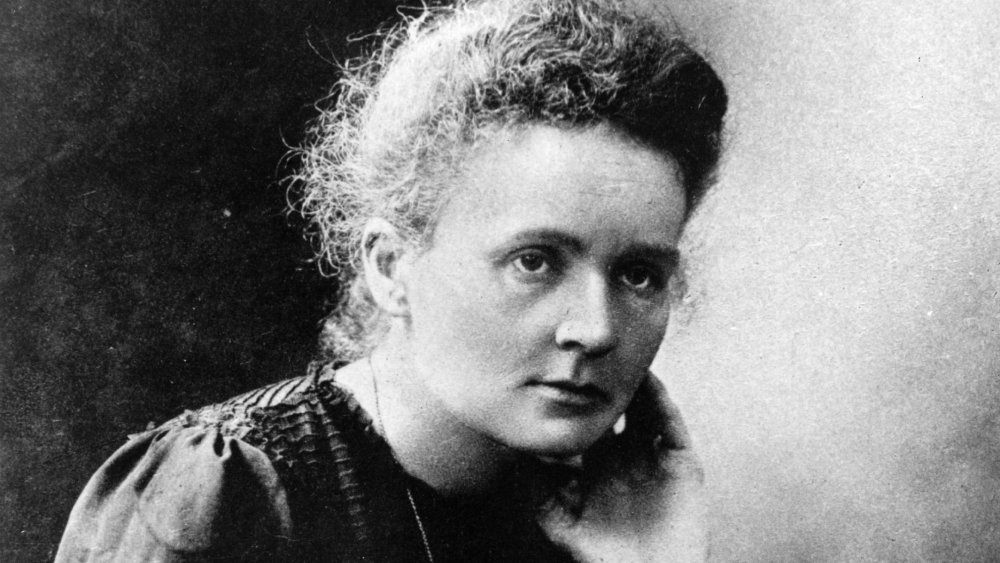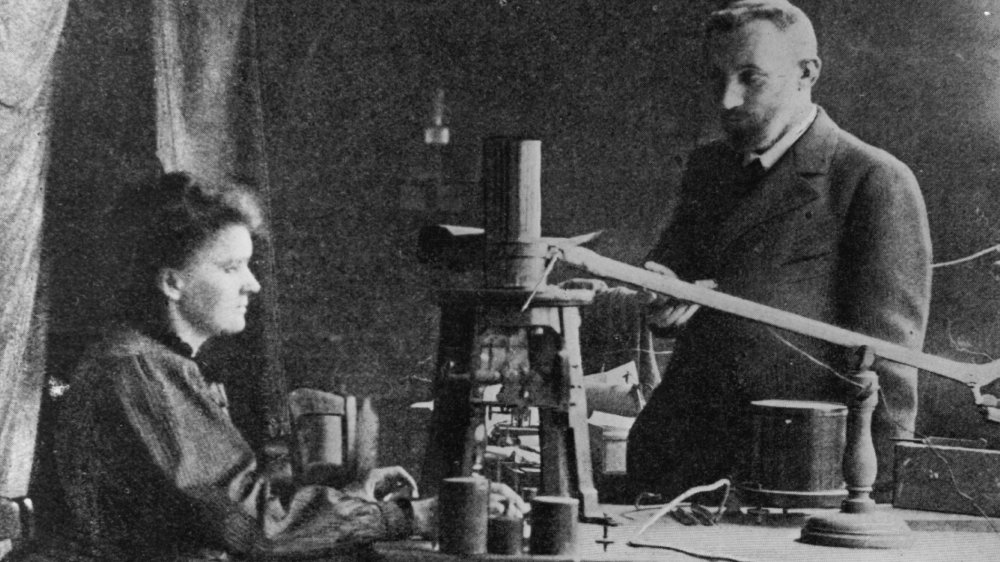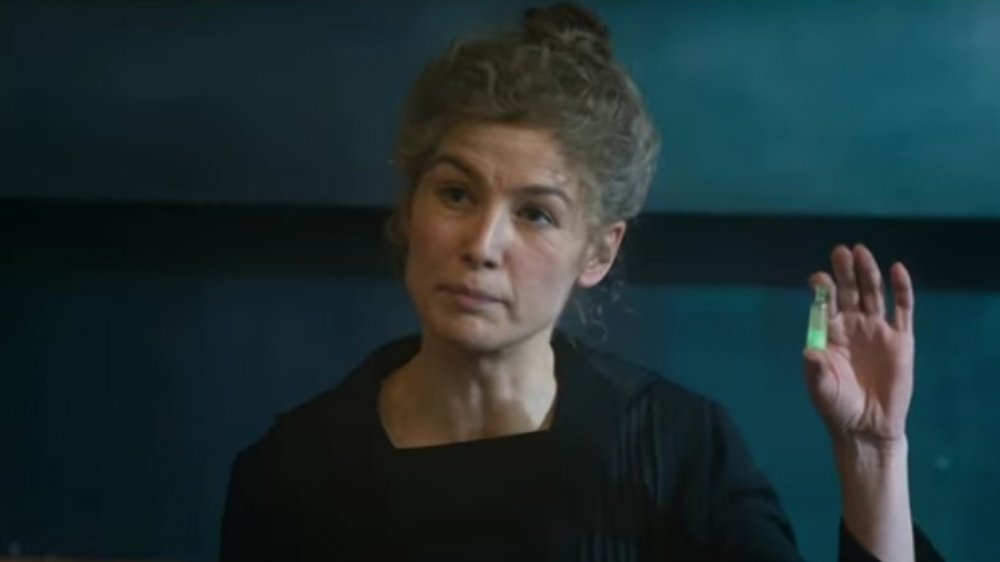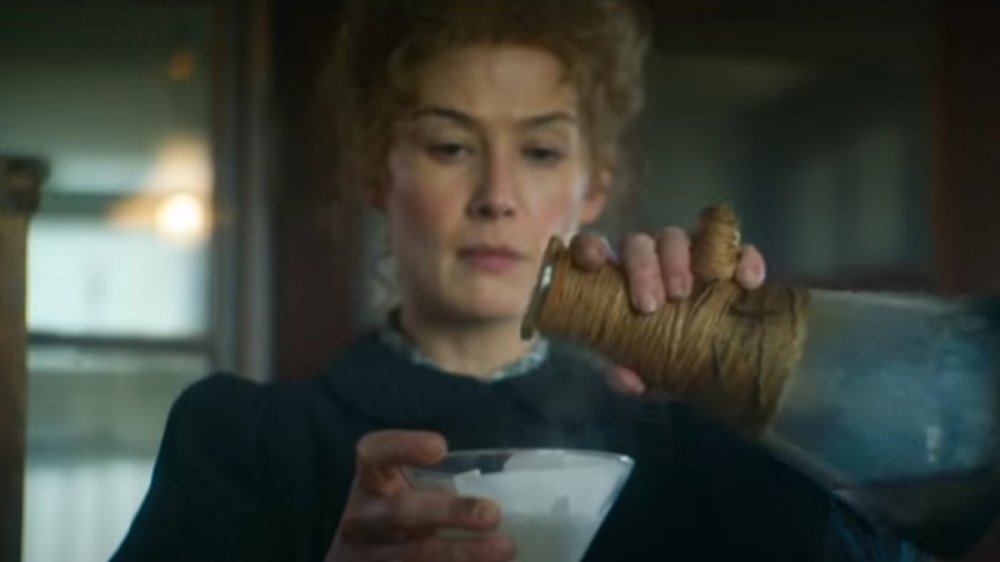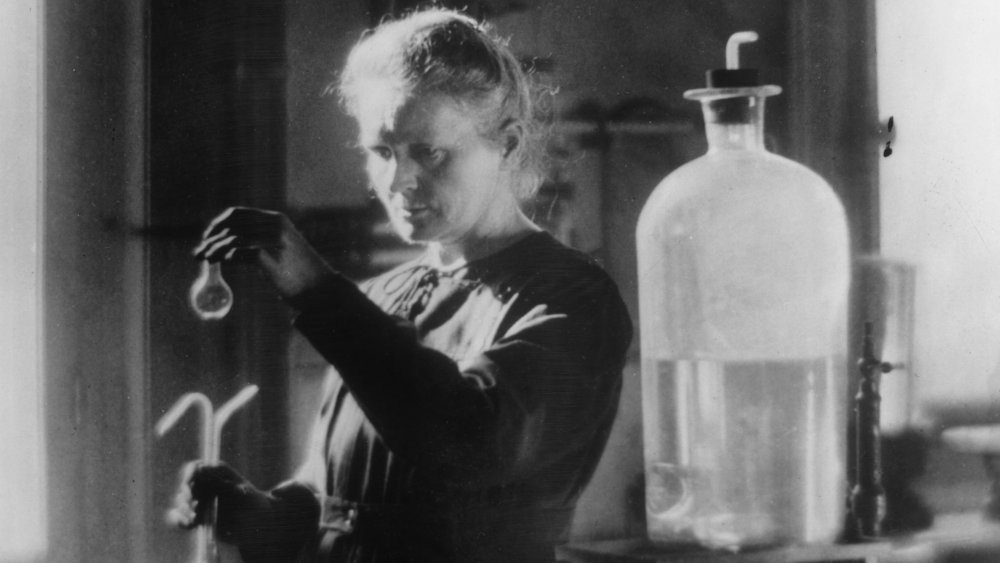What Radioactive Doesn't Tell You About Marie Curie
Every so often, someone comes along in human history who simply fast-forwards civilization, someone so off-the-charts brilliant and insightful, dedicated and hard working, that you read their story and wonder, "How could I possibly do anything that important?" What gets missed is that these very special specimens of humanity are also that — deeply human, and while they're often single-handedly (and single-mindedly) responsible for massive leaps in knowledge and understanding, they also, from time to time, might have needed a nap — just like the rest of us here mortals. Go ahead. Make your list. Check it twice. But if there's no one else, make sure it includes Maria Salomea Skłodowska — Marie Curie.
She was born in Warsaw — now the capital of Poland, but then occupied by the Russians, as Smithsonian tells us — on November 7, 1867. (For context: That's two years after the end of the American Civil War.) Her father taught physics, and she was recognized early as brilliant, shining in both literature and math. She worked for years as a governess to save enough money to go to college, and when she was 24 she entered the Sorbonne, in Paris, and began to refer to herself as Marie, says Encyclopedia Britannica. Money was still tight — she did menial work in labs and skipped meals to make ends meet, but completed her degree in physics in 1893 and, the next year, a second degree in mathematics.
Marie and Pierre were partners in life and in research
That was when she met Pierre Curie, a fellow scientist investigating subjects like crystals and magnetism. She needed lab space; he had lab space available, says Biography, adding that they were "completely devoted to one another." It was one of those matches made in heaven: at one point he wrote to her, "It would ... be a beautiful thing to pass through life together hypnotized in our dreams: your dream for your country; our dream for humanity; our dream for science."
He was working as a physics professor, says the BBC; they married in 1895, the year Wilhelm Röntgen discovered x-rays. Other scientists contributed to a rapidly expanding understanding of the world of physics, but Marie's lab work resulted in what Smithsonian calls a "daring" hypothesis: the rays being detected "might be a basic property of uranium atoms, which we now know to be subatomic particles released as the atoms decay."
Pierre stopped his own research to join her in her work. Together they studied, experimented, and researched (part of their work was accomplished through use of an electrometer Pierre had invented with his brother) resulting in the discovery in 1898 of not one, but two elements: polonium and radium.
Rosamund Pike plays Marie in "Radioactive"
In 1903 Marie was the first woman in France to be awarded a PhD in physics. The groundbreaking discoveries emerging from the Curies' lab naturally attracted attention of the Nobel Prize committee. At first, members of the committee were reluctant to attribute the brilliant insights to Marie — surely the credit belonged to her male colleagues. It was Pierre who lobbied on her behalf. The 1903 Nobel Prize in Physics was awarded to Henri Becherel, Pierre Curie — and Marie. She was the first woman so honored. As a result, Pierre was named a full professor at the Sorbonne; in turn, he named Marie the head of the laboratory.
Pierre was killed, run over by a carriage, in 1906. Marie took over his teaching position — the first woman to do so. Besides the challenges of being accepted for her mind, not denied because of her gender, Marie came to be discredited because she was Polish. France was becoming increasingly xenophobic at the time, and when her 1911 affair with one of her husband's students came to light (he was married, but separated) she was attacked not only as a homewrecker, but a foreign homewrecker.
"Radioactive" is based on a graphic novel
Tabloid-style news is nothing new, and that story nearly overshadowed another achievement for Marie that same year: She was awarded a second Nobel Prize, this time in chemistry — the first woman to win a Nobel was now the first person of any gender to win two.
With the outbreak of World War I in 1914, Marie developed and outfitted mobile x-ray units to treat the wounded on the front lines, and established an additional 200 x-ray stations, practical application of the research she had accomplished with Pierre for "pure science." She continued her research after the war, though her health was clearly compromised by her long-term exposure to radioactive elements. She was just 66 years old when she died on July 4, 1934, of aplastic anemia, according to the Nobel Prize website.
There have been attempts to celebrate Marie on the big screen — Greer Garson earned an Academy Award nomination for her portrayal in 1943's Madame Curie, reports Deadline, and 2010 saw the publication of Lauren Redniss's graphic novel Radioactive: A Tale of Love and Fallout, says the Boston Globe.
Marie's brilliant research contributed to her early death
It's this latter incarnation of the Curie story that provided the basis for the most recent entry in the canon, a biopic titled Radioactive, originally screened at the Toronto International Film Festival in September 2019. Rosamund Pike plays Marie. Like many film biographies, Radioactive takes a few liberties on its way to present a true, if not entirely factual, sense of an historical individual. For instance, as the Globe points out, the film includes a segment that claims Pierre traveled alone to Stockholm in 1903 to accept the couple's shared Nobel Prize; in truth, the couple traveled together, in 1905. Other parts of the film suggest Marie had a deep-seated phobia regarding hospitals. The Guardian points out that there's no evidence to back that up. Even the approach can be viewed as flawed — "an imperative to make her sexy contradicts her frequently stated desire to be prized for her intellect," The Guardian adds.
New Scientist points to a cinematic moment in which Marie says, "There are those that say my radium is making them sick." The facts would seem to indicate that, "though troubled by reports that linked radiation to sickness, the real Curie reportedly never fully admitted that her research was behind her own ill health."
Radioactive is clearly imperfect, but as Time wrote, "a flawed movie with life in its veins is better than a pristine one that's dead on arrival." Judge for yourself – Radioactive debuts July 24 on Amazon.
